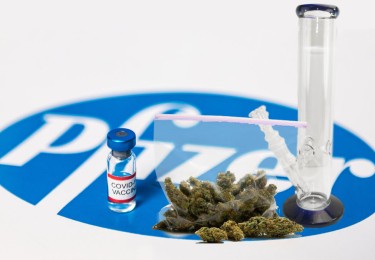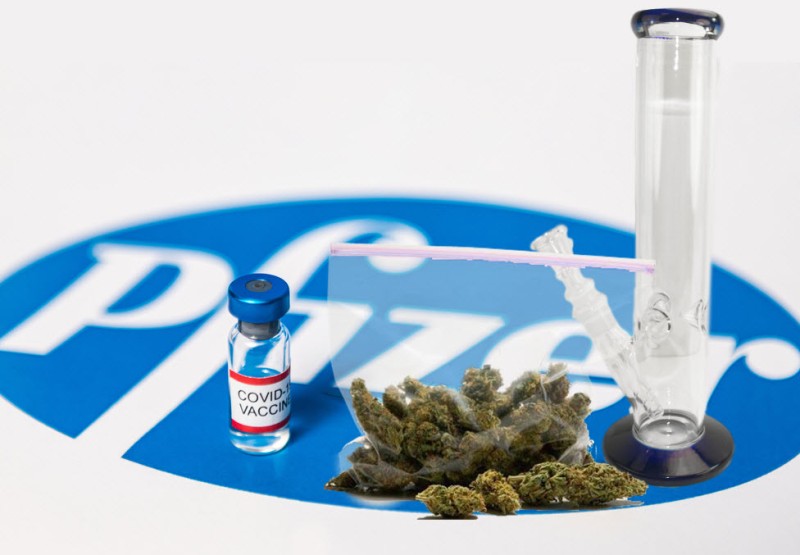
Pfizer is set to purchase a biotech company in view of producing cannabinoid-type therapeutics. Pfizer Inc, a global pharmaceutical giant, is a household name. The company recently announced that it would acquire Arena Pharmaceuticals Inc in a 6.7 billion dollars trade. This move will make Pfizer a force to be reckoned with in the medical cannabis industry.
Both companies have confirmed that a definitive agreement has been reached and signed. All outstanding shares of Arena will be transferred to Pfizer at $100 per share in this all-cash business deal.
Once all necessary approvals are gotten, Pfizer will finance all the transactions with available cash at hand.
About Arena Pharmaceuticals
Arena Pharmaceuticals, based in San Diego, California, is a biotech company with a cannabinoid-type therapeutics segment in its pipeline. The research and development of Olorinab, an investigational drug candidate, is at the heart of its cannabis biotech operations (APD371). This is an oral cannabinoid receptor 2 full agonist that is being studied for the treatment of a variety of symptoms, with a focus on visceral pain associated with gastrointestinal illnesses.
According to the company's website, Olorinab is not approved for use by any health body. It is an experimental drug that is still undergoing clinical trials.
The website also states that the drug is being improved to ensure it has no adverse psychoactive effect on the patients. The drug has a selectivity for CB2 against CB1. The CB1 and CB2 receptors bind to the endocannabinoid system, a complex cell-signaling system. These receptors can be found throughout the human body. Endocannabinoids, including THC and CBD, can bind to both receptors to signal the endocannabinoid system that it is time to act. Nonetheless, the drugs are dependent on the endocannabinoid receptor and the cannabinoid's interaction with the receptor.
The company's drug pipeline also concentrates on other drugs that are not derived from cannabis. The company's main objective is to develop efficient and innovative therapies that can be used to cure, treat or manage specific immuno-inflammatory ailments. While the cannabis industry jumped on the headline of Big Pharma buying their way into the marijuana industry, some have suggested that the IBS and stomach medicine niche is becoming so competitive that Pfizer was just interesed in the medicines, not because they are looking to get into the cannabis space. This may be a case of buying a medicine group for anti-inflammatory stomach issues, not just looking to buy into weed.
About Pfizer Pharmaceuticals
Pfizer is a pharmaceutical company that produces over 350 different drugs. Headquartered in New York City, it is a publicly-traded global pharmaceutical company which made over $50 billion in revenue alone in 2019.Popular drugs like Eliquis, Enbrel, EpiPen, Depo-Provera, Dimetapp, Neosporin, Xeljanz, and Zithromax/Zmax are all manufactured by Pfizer. It specializes in cancer, heart, and diabetes treatments, as well as vaccines. It also makes medicines for endocrine (hormone) and nervous system disorders.
The company is owned by its shareholders and operates in 180 countries. Groton, Connecticut, is where the company's research headquarters are located. It employs over 96,000 people all over the world.
The New Deal
Mike Gladstone, global president and general manager of Pfizer Inflammation and Immunology unit, said that the acquisition of Arena is in line with the company's capabilities and expertise in immunology and inflammatory-related conditions.
Over the years, Pfizer has successfully created an innovation engine that develops potential medicines for patients worldwide with chronic and debilitating immuno-inflammatory conditions. The company understands that there is an urgent need to look into other treatment options with high potential, which is where Arena's cannabinoid-drug pipeline comes in.
Pfizer plans to accelerate the clinical development of etrasimod for patients with immune-inflammatory diseases by leveraging Pfizer's world-class research and development capabilities (Arena's drug candidate for treating immune-mediated and inflammatory disorders is etrasimod).
The President and CEO of Arena, Amit D. Munshi, disclosed that this transaction represents the best next step for both patients and shareholders. "Pfizer's capabilities will help us complete our mission of getting vital medicines to patients faster," stated Munshi.
He also added that Arena is glad to be acquired by Pfizer. According to him, this means that Arena's contribution to meeting the medicinal needs of various immune and inflammatory diseases is being felt. He also mentioned that Arena is one of the best in class S1P molecules.
According to the press release, the proposed transaction is subject to customary closing conditions, such as regulatory approvals and stockholder approval.
Other Big Pharma is also betting on the cannabis space
Pfizer is not the only big pharma in the cannabis industry, neither is it the first to venture into this sphere. Big pharma like Jazz Pharmaceuticals, Johnson & Johnson, and Tilray obtained interests in cannabis-related companies as far back as 2017. The widespread acceptance of the drug during and after the pandemic's peak enlightened many companies on the medicinal potential of cannabis.
Jazz Pharmaceuticals acquired GW Pharmaceuticals, a cannabinoid drug company known for developing Epidiolex, the first FDA-approved CBD medicine for treating children with severe epilepsy, in February 2021. Last year, Epidiolex sales totaled more than $500 million. The medication was first approved to treat seizures associated with Lennox-Gastaut syndrome and Dravet syndrome. It was recently approved to treat seizures associated with tuberous sclerosis complex.
In 2017, Johnson & Johnson brought in a cannabis company, Avicanna, into a Toronto based innovation center. The 40,000-square-foot life scribes innovation center is found within Mars Discovery District. The labs offer a flexible environment for startups looking to develop new technologies and research platforms to advance medical care without Johnson & Johnson taking a significant stake in these companies. Medical cannabis company, Novartis AG, is another big pharmaceutical company that has its toes dipped into the cannabis industry. It entered into a supply and distribution agreement with Canadian cannabis giant Tilray.
Bottom Line
Big Pharma's interest in the medical cannabis industry, like that of Big Tobacco, is growing in tandem with the space's rapidly evolving cannabinoids industry. Cannabinoids research is yielding promising results in the treatment field. As a result, pharmaceutical companies are expected to become more involved in the medical cannabis industry in the coming years.
As an American multinational pharmaceutical and biotechnology corporation, Pfizer sets an example for other big pharmaceutical companies across the country. The success of this venture, as well as the approval of better cannabis policies, would drive more innovations into the cannabis industry.
Monday morning, Pfizer shares were worth at least 5% higher at $55.43 per share. This increase can be attributed to its announcement about delving into the cannabis industry.
MORE ON BIG PHARMA AND CANNABIS, READ THESE...
IS PFIZER BUYING INTO THE MARIJUANA GAME AT THE RIGHT TIME?
OR...
BIG PHARMA WANTS TO SEE CANNABIS AS A SCHEDULE 2 DRUG.
OR..
GW PHARMA, ARE THEY ARE FRIENDS OR FOE TO THE CANANBIS SPACE?









